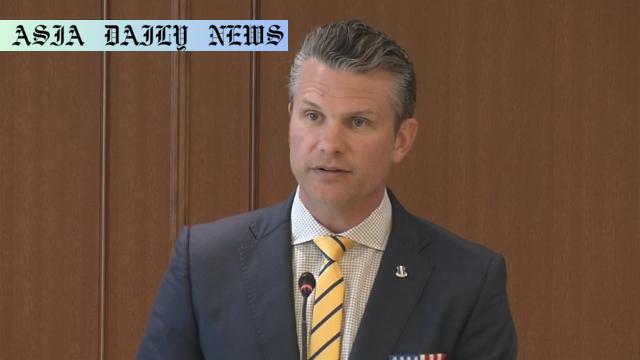Pentagon chief denies claims of sharing sensitive data with wife.

Pentagon Chief Dismisses Allegations of Confidentiality Breach
In a controversial turn of events, U.S. Defense Secretary Pete Hegseth finds himself at the center of allegations concerning the misuse of classified military information. Recent reports have accused Hegseth of sharing sensitive details about a Yemen military operation within a private group chat that included his wife and brother. Such allegations, fueled by a Sunday report in the New York Times, have sparked widespread media attention alongside growing scrutiny on Hegseth’s role and position within the Pentagon.
Addressing reporters, Hegseth dismissed the allegations as baseless rumors derived from “anonymous sources” and “disgruntled former employees.” He emphasized that the claims were old news meant to tarnish his reputation, suggesting that certain individuals within the media were intent on spreading misinformation. Hegseth’s firm denial comes amidst the larger backdrop of tensions surrounding classified information security, further intensifying the complexities of the situation.
White House Reaction and Political Implications
President Donald Trump has joined the defense of Pete Hegseth, stating that the reports are simply another orchestrated attack by the media. Describing Hegseth as “doing a great job,” Trump underlined his continued support for the Defense Secretary amidst growing rumors of leadership changes within the Pentagon. Meanwhile, the White House press secretary, Karoline Leavitt, dismissed related claims of a search for a new defense secretary as “total FAKE NEWS.”
The allegations have nonetheless prompted questions regarding the Department of Defense’s operational transparency and adherence to protocol. A former Pentagon spokesperson editorialized in Politico about the turbulence within the Defense Department, describing recent weeks as “a month of total chaos.” While this view suggests far-reaching implications for Hegseth’s tenure, no official statements have been issued suggesting a formal review or consequence stemming from these claims.
The Larger Context of Security and Accountability
This controversy amplifies ongoing debates surrounding the security of classified information within high-stakes government operations, highlighting vulnerabilities that threaten operational sanctity and governance protocols. With accusations circling around Hegseth, the question remains whether internal checks and balances are sufficient to prevent such breaches—or, in this case, to determine the veracity of the claims made.
For the Pentagon, this set of allegations extends beyond a singular individual and reflects broader accountability within the defense sector. Any proven breach of protocol involving classified information could compromise military operations and endanger global security. As such, the sensitivity of this issue requires careful examination and evidence-based investigation, foundational steps to ensure confidence in national security measures.
While Hegseth maintains his innocence and the administration stands by him, the reputational damage may continue to mount until proven otherwise. The way this controversy unfolds will serve as a significant case study in addressing leadership scrutiny, media integrity, and national security safeguards.
Commentary
The Integrity of Leadership Under Scrutiny
The allegations against U.S. Defense Secretary Pete Hegseth bring forward critical issues about leadership integrity and the repercussions of operational oversights. When a senior government official faces accusations of mishandling classified military information, it raises inevitable doubts regarding the credibility of governance structures and decision-making at the highest levels.
There is no denying that public figures, especially those in defense roles, are under immense pressure to act responsibly and maintain transparency. At the same time, baseless attacks or misinformation can gravely harm reputations without necessitating accountability from those spreading it. Hegseth’s dismissal of the allegations as media spin or disgruntled employee narratives is a reminder of how perception often holds unrivaled power in public discourse.
The Role of Media and Misinformation
The media plays an indispensable role in holding authorities accountable, but the fine line between accountability and distortion blurs when sensationalism overshadows facts. Allegations such as those surrounding Hegseth underscore the importance of thorough investigative reporting. Without evidence, claims remain speculative and fuel unnecessary chaos and distrust, as seen in this instance.
Moreover, the White House’s strong defense of Hegseth reinforces loyalty but also brings into question whether impartial systems are in place to address any credible missteps by officials. Balancing political allegiance and independent truth-seeking is critical for public confidence but rarely achieved without conflict and skepticism.
Ensuring Transparency Amid Political Storms
In a rapidly changing geopolitical landscape, safeguarding classified information and ensuring fair leadership evaluations have become pillars of national security and institutional trust. The ongoing Hegseth controversy serves as a litmus test for how quickly media claims, government responses, and public opinion collide—and whether they result in clarity or confusion.
Regardless of the final resolution, this incident reminds us of the delicate balance leaders must maintain in their actions and communications. It further highlights the pressing need for implementing secure and transparent processes to handle sensitive information while holding officials accountable without relying on media-driven narratives alone.


